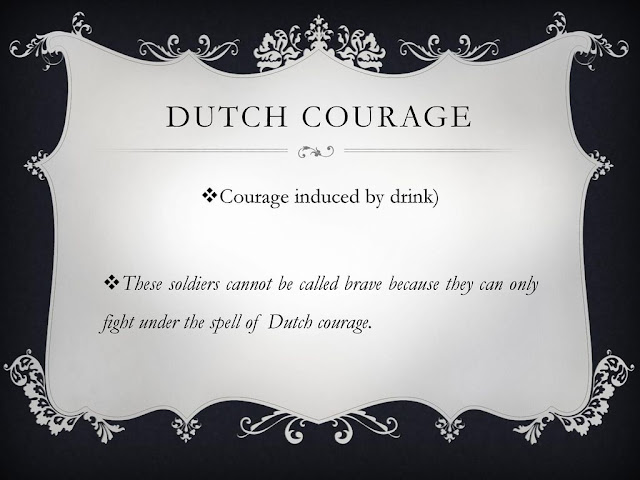To have Dutch courage is to lose fear or inhibition by drinking alcohol. There are two main theories as to its origin:
1. From a (purportedly medicinal) Dutch gin:
In 1650, Franciscus Sylvius, a Dutch doctor, created Dutch gin in an attempt create a diuretic medicine. This was then used by soldiers in the Thirty Years' War by English troops and was an instant success for its warming properties on the body in cold weather and its calming effects before battle. Source
According to this theory, the specific reference to gin later became generalised to all alcohol.
2. The Battle of Medway
In June 1667, the Dutch fleet sailed up the River Medway and caught the English unprepared. ‘The Dutch Raid’ was one of the greatest disasters in England’s naval history.
.jpeg) |
| Burning of English fleet off Chatham, 20 June 1667, by Willem van de Velde the Younger |
The notion that the English sailors needed alcohol to find the resolve for the fight may be connected to a broader sense of national shame
Anti-Dutch Sentiment
A common thread in both origin stories is ambivalent national feelings about the Dutch. Theoretically, they were natural allies, being fellow protestants, threatened by French/Papal power.Indeed. it was the Dutch king (William of Orange) who took the throne following the Glorious Revolution of 1698. ‘King Billy’ was hugely popular for ‘saving’ England from a Catholic accession.
At the same time, a foreign monarch will always inspire some mockery and resentment. Relations between the two powers remained tense. Indeed, England (later Great Britain) fought the Dutch in four wars between 1652 and 1784.
New enemies
Dislike of the Dutch eventually faded. By the Nineteenth Century, popular resentment was firmly redirected towards Britain's neighbours across the Channel.
